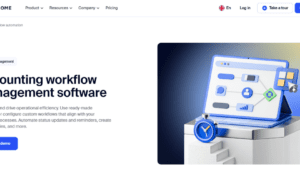AI is fundamentally transforming every industry, and SaaS is no exception. AI has completely transformed how companies function and deliver value to their customers. Integrating AI in SaaS has opened new doors for growth and innovation.
According to the SaaS industry statistics, global AI software revenue is estimated to grow to $118.6 billion by 2025, a significant increase from $9.5 billion in 2018. The report anticipates AI will be a standard feature in almost all new software products and services by 2025.
Chart by Statista outlining the industries
Let’s delve deeper into how AI impacts the SaaS industry, but first, we need to understand what SaaS and AI are.
What is SaaS?
SaaS stands for Software as a service. It is a process where software is accessed through a subscription-based rather than installation. Since it offers flexibility and scalability compared to traditional methods, users can access software hassle-free through the web.
A key highlight of SaaS is its recurring revenue model, which makes it particularly attractive to investors due to its predictable and consistent income stream.
What is AI?
Artificial intelligence is a multidisciplinary field that integrates ideas from computer science, cognitive science, linguistics, psychology, neuroscience, and mathematics.
It focuses on creating machines that act, behave, and perform like humans. AI systems can learn from the extensive data and even self-correct their actions.
This enables machines to perform tasks requiring human intelligence, such as understanding natural language and identifying patterns in complex datasets. From image recognition software and predictive pattern recognition to chatbots that answer questions, AI has completely changed our lives and way of living.
Integration of AI in the SaaS Industry
The potential and capability of AI is to learn from the vast data to enhance SaaS applications, making them smarter and more adaptable. Integrating AI into SaaS products enables them to deliver personalized experiences, gain insights, and automate previously impossible tasks.
It also empowers businesses to make data-driven decisions and optimize their operations. One area where AI significantly revolutionizes operations is maximizing customer experience through AI-powered virtual assistants, chatbots, and virtual assistance.
These advanced generative AI tools can understand and respond to customer queries and resolve them promptly. Not only this, but it also predicts the customer’s needs. Since AI is on board, businesses can leverage AI to provide prompt and round-the-clock assistance & support at the best possible time.
Advantage of AI by Integration into SaaS Applications
From buzzword to reality, AI is everywhere now. The horizon of artificial intelligence in SaaS shines with commitment and promise. From streamlining business operations to improving user experience, AI transforms how we do business and paves the way for a more efficient, secure, and personalized future. Artificial intelligence has revolutionized software solutions, making them more intelligent, efficient, and customized. Let’s see how
- Personalization: Artificial Intelligence enables enterprises to create highly personalized campaigns by collecting, analyzing, and organizing users’ data and experiences to address individual needs and interests. This helps to maximize engagement and customer satisfaction.
- Predictive Analytics: Businesses can leverage AI’s benefits to analyze extensive data sets to forecast future outcomes and trends. This helps businesses improve decision-making and anticipate needs.
- Automation: Powered by machine learning and natural language processing, AI systems continuously improve performance. These tools learn from new feed information, increase productivity and faster response time, and enhance operational efficiency.
- Customer Support: Integrating AI-powered tools into CRM systems helps to simplify various day-to-day business operations, like data entry and lead scoring, while providing valuable insights for sales teams to focus their efforts more effectively. AI-driven support tools, like Chatbots have also revolutionized customer services and making it more efficient than ever before.
- Security: AI innovations, like natural language processing, enhance cyber security by improving threat detection and user behavior analysis.
- Cost efficiency: AI in SaaS applications can also reduce cost and improve efficiency by automating tasks and streaming workflow. Small to large businesses can leverage AI tools to improve productivity.
Also read: How to Implement Adaptive AI in Your Business?
Top AI-based SaaS Products Best for Your Business
-
AI-Driven Customer Relationship Management (CRM)
AI revolutionizes CRM software by surpassing traditional methods to provide insight, personalization, and automation that help maximize customer satisfaction. This transformative capability significantly enhances the customer experience, helps them stay ahead of the competition, and leads to customer satisfaction and engagement.
Features of CRM tools
- Personalized Customer Insights
- Automated Lead Scoring
- Dynamic Pricing Optimization
- Intelligent Customer Services
According to Make Web Better, 82% of businesses, including Wells Fargo, Spotify, Amex, and others, leverage the benefits of CRM systems for sales reporting and process automation.
Today, businesses have realized the potential of AI. AI is everywhere, and AI in CRM has become a significant tool. It enables companies to build strong customer relationships, make more money, trust, and stay ahead of the crowd.
-
Intelligent Project Management Software
Intelligent Project Management Software is designed to help businesses make informed decisions by analyzing various factors, including dependencies, team performance, and market conditions.
This reduces repetitive tasks and streamlines the project process efficiently. When looking for solutions, partnering with the best app development company in India can ensure tailored and effective implementation.
According to the Mordor Intelligence report, the Project Management Software Market is currently valued at USD 6.54 billion and is estimated to grow at USD 10.86 billion by 2029.
The key features of Intelligent Project Management software are
- Smart Decision-Making for Project Managers
- Predictive Project Timelines and Resource Allocation
- Adaptive Project Planning
- Integration with Third-Party Tools
By leveraging these features into play, Intelligent Project Management Software doesn’t just make projects run smoother – it supercharges them.
-
Data-driven HR Solutions
Data-driven HR solutions have changed how we do business and manage the workforce, providing a more strategic and proactive approach to human resource management. Allow me to show you some of the best features integrated with data-driven HR solutions:
- Automated Candidate Screening:
- Diversity Metrics
- Retention Strategies
- Predictive Analytics for Hiring
The statistics are clear—94% of business leaders say analytics elevates the HR department, and 71% say it is crucial for dominating HR strategies.
Leveraging these unparalleled features can help organizations attract genuine candidates for their extensive requirements. Additionally, it can help make better decisions, improve HR processes, and create a more engaging and productive work environment.
Conclusion
The integration of AI and SaaS represents a transformative moment in digital technology. AI-powered SaaS applications developed by an AI software development company have reshaped daily life, from workplace communication to media consumption. Now, with AI integration, we’re poised for even greater innovation.
Yet, along with opportunities come challenges like shadow AI and cybersecurity threats. Overcoming these hurdles requires careful planning. SaaS providers can successfully integrate AI while maximizing its benefits by focusing on low-risk, high-value AI projects, maintaining data quality, and using AI for cybersecurity. So, if you’re looking for the best app development company in India to create an AI-powered SaaS application, count on us.




































